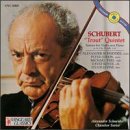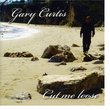| All Artists: Schubert, Schneider, Serkin, Tree, Soyer Title: Trout Quintet / Violin Sonata Members Wishing: 0 Total Copies: 0 Label: Vanguard Classics Release Date: 4/8/1993 Genre: Classical Styles: Chamber Music, Historical Periods, Classical (c.1770-1830), Instruments, Strings Number of Discs: 1 SwapaCD Credits: 1 UPC: 723918800523 |
Search - Schubert, Schneider, Serkin :: Trout Quintet / Violin Sonata
 | Schubert, Schneider, Serkin Trout Quintet / Violin Sonata Genre: Classical
|
Larger Image |
CD DetailsSimilar CDs
|
CD ReviewsSparkling Schubert 10/27/1998 (5 out of 5 stars) "This is one of the most light and sparkling Trouts available. It is a sheer joy to listen to--with Brendel's version, my favorite. The ensemble playing is both crisp and sensitive, and the recorded sound excellent. (All of the various complements this recording have had on CD are worth having: the Schubert sonata, as here, the Mozart Piano Quartet, or the Dvorak.)" Schubert at his finest: bravo especially to Mr. Peter Serkin Vera Kolb | Kenosha, WI | 06/09/2007 (5 out of 5 stars) "If there were a competition for the musical composition that one can listen to repeatedly without musical saturation, I think that Schubert's "Trout" Quintet would win. I clearly remember spending two months in Amsterdam in the late 1980s, walking around the city with my Sony Walkman (my dearest possession) on, listening to the "Trout" and burning batteries in the process. I do not remember much about the environment, all the canals and buildings sort of blended together. Now, many years later, I am revisiting the "Trout", but another performance. I have chosen Alexander Schneider's recording, since I like him a lot. I actually have a Musical Heritage Society recording with the same content as the CD listed here on Amazon.com. As soon as I heard the beginning of the CD, I immediately asked: "Who is this pianist?" It is Peter Serkin. He is great, elegant to an extreme, musically savvy, perfect as a dedicated member of the quintet team. Then I remembered how much I admired him in another one of his recordings with Alexander Schneider (Schubert's Sonatinas for Violin & Piano). I was listening now the "Trout" just for the piano part, and could not have enough of it. This is not to say that the rest of the players were not great, it is just that Mr. Serkin was surprisingly inspiring. The other players were Alexander Schneider, violin, Michael Tree, viola, David Soyer, cello, and Julius Levine, double bass. They all have admirable pedigrees, and it shows! This whole affair of listening to Serkin's piano part precipitated in me an enormous existentialist crisis. You know the type: if you make one choice, you lose on the other choices that you could have taken instead (the problem explained in the excruciating details to us by the French existentialists, such as Albert Camus and Jean-Paul Sartre). So, here I was feeling that I had made wrong choices in my musical life. Why is that I have missed so many of Mr. Serkin's recordings, four decades to be precise? Perhaps I should have spent less time producing a screeching sound on my violin, and should have instead listened to the great perfection, inspiration, and musical professionalism of Serkin. On a positive note, which I do not remember was pointed out by the said French existentialists, the life is not over until is over, and we may make up for some past choices. Thus, I made a note for myself to listen to much more of Peter Serkin in the future. My favorite violinist, Alexander Schneider, outdid himself in the hauntingly beautiful Sonata in A major, Op. Posth. 162. Here he was lush and warm, let himself shine and his sound soar. Peter Serkin was a perfect accompanist. I give to this Sonata, oh, well, 10 stars. In my CD I have an insert with the notes by Sidney Finkelstein, which are very informative, engaging, and beautifully written. I have read the notes after I have listened to the CD. It was gratifying that in the Sonata the connection I have made with Beethoven, Finkelstein also did. In conclusion, this is a great recording, a masterpiece to be precise. So, what are you waiting for? Get this CD and, I promise you, it will not be the one that gathers dust! " A good "Trout" from 1965 with veteran Alexander Schneider an Discophage | France | 10/21/2006 (4 out of 5 stars) "It is amusing to think that son Peter Serkin made his recording of Schubert's "Trout" Quintet before father Rudolf. This Vanguard recording, in which young Peter (he was then 18 years-old) joins veteran Alexander Schneider (long time 2nd fiddler from the Budapest Quartet), was made in 1965, while Rudolf's famous version from Marlboro (now with Mozart's clarinet Quintet on Sony) was recorded two years later, in 1967. Both recordings also share bassist Julius Levine (other partners were Michael Tree and David Soyer of Guarneri Quartet fame), as well as some interpretive features, the most notable being a strikingly similar and characteristic phrasing of the famous "Trout" theme which serves as the basis of the 4th movement's variations..
The opening "Allegro vivace" (taken with its repeat) starts with a powerful utterance of the initial chord and the intro is spaciously phrased, but the band soon accelerates and the ensuing development (0:48) is urgent and muscular. In Vanguard's digital remastering, the sound is great, with no audible tape-hiss and fine instrumental definition, and the viola and cello accompaniment figure starting at 0:48 has a strikingly vivid presence. Of note are also Alexander Schneider's rich, creamy texture and fine expressivity (though he is tempted to "over-interpret" the triplet runs starting at 1:32, at the expense of clear articulation), David Soyer ample cello tone in his dialogue with violin starting at 1:49, and Serkin's clarity of articulation, with fine nuancing and no over-pedaling. The ensuing Andante is taken at a spacious tempo, very similar to the one adopted by David Glazer and the Fine Arts Quartet in 1962 (Boston Skyline) or by Curzon and the Wiener Oktett members in 1957 (Decca - see my reviews of both). The result is very lyrical and deeply felt, with the viola and cello cantilena starting at 1:30 acquiring the brassy overtone of some funeral march. Curiously Serkin and bassist Levine seem slightly out-of-sync in the way they pass to each other some identical rhythmic figures in the passage starting at 2:15, tightly phrased by Levine and more slackly by Serkin. The Scherzo is also quite deliberate - again an approach shared by the Fine Arts Quartet, or further back by the classic Schnabel and Pro Arte Quartet members from 1935 - but strongly articulated, with perky staccato and an accented middle trio, taken with no slowdown of tempo. Schneider string band's utterance of the famous "Trout" theme (the piano is silent then) is notable for its unusually slow tempo and plaintive, almost wailing tone, and more notable still is that it is strikingly similar to the way Rudolf Serkin's Marlboro partners phrased it two years later. It is true that Rudolf also had a long-standing association with Schneider's Budapest Quartet. A fine set of variations follow, with a few notable traits. The first variation displays a highly expressive violin, even in its accompaniment figures; the characteristic trills have none of the suavity and charm one expects, but are forcefully delivered, and the result is slightly comical though not unpleasant: it conjures images of some Tex Avery cartoon birdy whose constant chirping wakes the bear over and over again and drives him crazy. Throughout the movement Serkin's piano is marvelously articulated, nimble and witty, and, in variations 3 and 4, very dynamic and full of bounce. The movement ends with an unhurried coda, very colorful, strongly articulated, with fine piano staccato. To finish with my father-son comparison, where dad's approach of the Finale in 1967 is boisterous and urgent, son and his partner's in 1965 is easy-going, even pedestrian (it walks rather than runs, but vigorous - again very similar to the 1962 Fine Arts Quartet, and a perfectly valid approach. Overall, today's ensembles seem to favor a more urgent view of Schubert's masterpiece (judging from recent versions by Ax-Ma and partners or Archibudelli on Sony, Thomas Adès and Belcea Quartet on EMI, Paul Badura-Skoda and partners on Amiata among others), shorter on charm but stronger on dramatic tension. It is also convincing, but it does by not means invalidate the more spacious approach, prevalent in the sixties, exemplified by this recording. Vanguard first reissued the recording on CD as early as 1987, paired with Mozart's 2nd piano quartet K. 493 performed by the same personnel save bassist. They reissued it in 1991 as part of their "Alexander Schneider Chamber Series", now coupled with Schubert sonata for violin and piano, recorded a year before the "Trout" by Schneider and young Serkin (the original LP had the rondo op. 70 as a filler) - and this is the one to buy (Amazon doesn't seem to list the earlier release anyway). For those wanting the Mozart, it is preferable to buy the other Vanguard reissue in the same Alexander Schneider, now more coherently coupled with its kin, the 1st piano quartet. " |

 Track Listings (9) - Disc #1
Track Listings (9) - Disc #1


